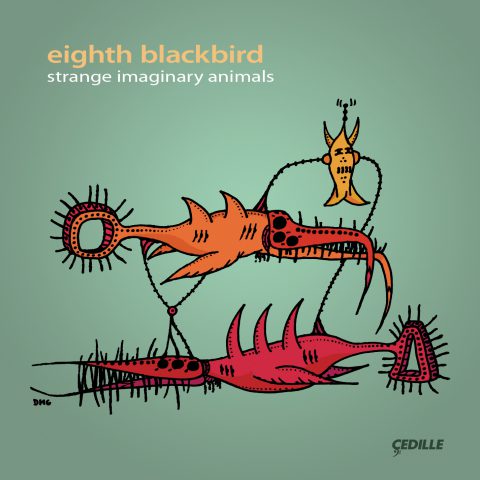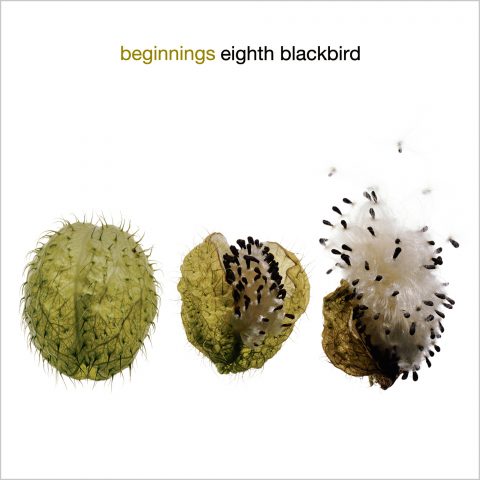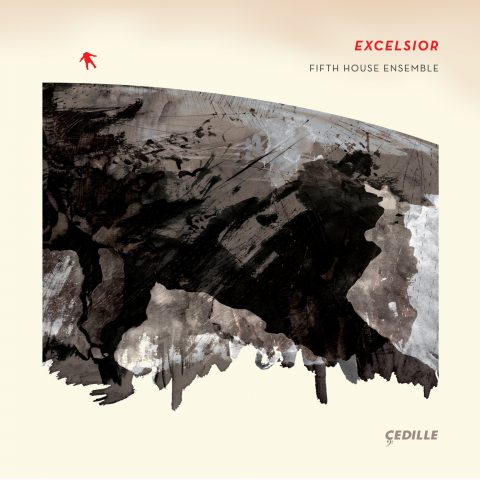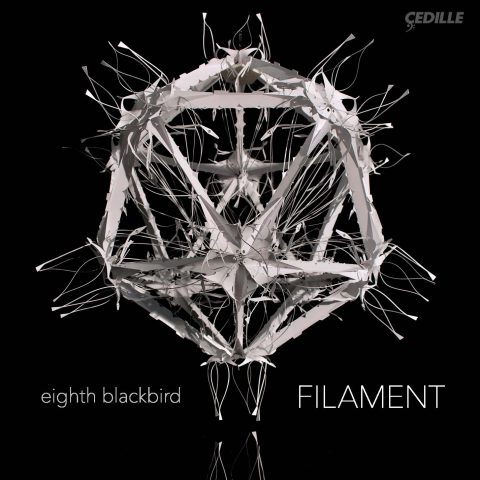| Subtotal | $18.00 |
|---|---|
| Tax | $1.85 |
| Total | $19.85 |
Store
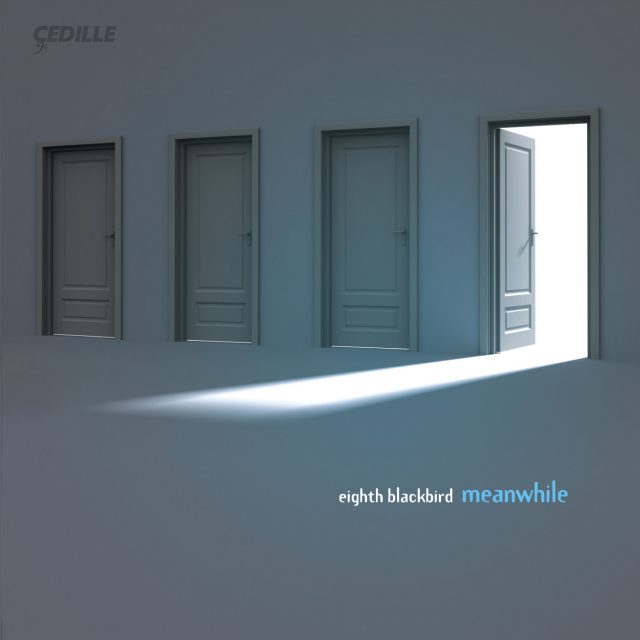
2012 GRAMMY Award Winner
Best Chamber Music/Small Ensemble Performance
Best Contemporary Classical Composition (Stephen Hartke: meanwhile)
“On this recording, eighth blackbird wanders through an unfamiliar house. With each track a new door is opened, releasing unexpected sounds and dramas. Some are sweet, touching. Others have hilarious quirks. A few possess a disturbing strangeness.” —eighth blackbird
The remarkable new-music ensemble eighth blackbird has won Grammy Awards for its last two albums on Cedille Records. Now, the “polished, personable, routinely dazzling sextet” (New York Times) returns with meanwhile, an album highlighting the kaleidoscopic diversity of contemporary classical music. meanwhile includes world-premiere recordings of three exciting and accessible works written for the adventurous young sextet: Stephen Hartke’s sparkling, fanciful Meanwhile: Incidental Music to Imaginary Puppet Plays (2007) looks to classical Asian puppet theater for inspiration, with gamelan-style Flexatones and piano altered to sound like a Vietnamese hammered dulcimer; Missy Mazzoli’s Still Life with Avalanche (2008) paints an idyllic landscape disturbed by unexpected news; and two movements from Roshanne Etezady’s Damaged Goods (2001) grapple with the psychic bruises of everyday modern life.
Preview Excerpts
MISSY MAZZOLI (b. 1980)
PHILIPPE HUREL (b.1955)
ROSHANNE ETEZADY (b. 1973)
from Damaged Goods
STEPHEN HARTKE (b. 1952)
Meanwhile: Incidental music to imaginary puppet plays
PHILIP GLASS (b. 1937)
THOMAS ADÈS(b. 1971)
ROSHANNE ETEZADY
from Damaged Goods
Artists
Program Notes
Download Album Bookletmeanwhile
Notes by eight blackbird
…meanwhile, an unexpected phone call gives a jolt, changing things unalterably.
…meanwhile, a vulnerable child is taunted by three schoolyard bullies.
…meanwhile, a soft-spoken trio processes mysteriously to the measured pace of an insistent, tolling bell.
…meanwhile, a renowned hypnotist practices his art with great skill.
…meanwhile, a couple sits quietly, facing their demons.
…meanwhile…
Still Life With Avalanche (2008)
Notes by Missy Mazzoli (b. 1980)
“I wrote this piece while in residence at Blue Mountain Center, a beautiful artist colony in upstate New York. Halfway through my stay I received a phone call telling me my cousin had passed away very suddenly.” This shock worked its way through the joyful, exuberant skin of Mazzoli’s music. Where rhythms grooved before, harmonicas now drone and strings buzz, sketching out a strange sonic landscape. Missy writes, “Still Life with Avalanche is a search for beauty in chaos, and vice versa. It is dedicated to the memory (the joyful, the exuberant and the shocking) of Andrew Rose.”
Still Life with Avalanche was commissioned by eighth blackbird through the support of Frederica and James R. Rosenfield, Kathleen Johnson and Paul Browning, Kirk Johnson, and William Johnson.
The young, Brooklyn-based musician Missy Mazzoli has worn many professional hats: composer, performer, administrator, and artistic assistant. She is a successful published composer, but is also the force behind the all-female indie band Victoire. Her music speaks with a voice that is lyrical and colorful, but a darkness lies humming just beneath the surface.
Music in Similar Motion (1969)
Notes by Philip Glass (b. 1937)
Music in Similar Motion could last all night, into tomorrow, perhaps forever. This early work is fast, stark, repetitive, hypnotic. Glass has reduced the elements of music to their simplest forms, a radical move inspired by the static, meditative language of Indian classical music. His music of this time is also a rejection of the complex, dissonant music written by his contemporaries. Music in Similar Motion can be played by any combination of instruments.
Philip Glass is America’s most influential living composer. The Baltimore native began as an iconoclastic downtown New York rebel, and has since composed for and collaborated with artists in every conceivable style and genre. The Philip Glass Ensemble, in which Glass plays keyboards, has been performing since 1968.
...à mesure (1996) for sextet
Notes by Philippe Hurel (b.1955)
…à mesure explodes with the force of a car crash. The title alludes to the French expression “au fur et à mesure,” which means “progressively” or “little by little,” and indeed this piece is in constant, gradual change. Melodies disintegrate or decay, speed up, slow down, settle into machine-like loops. Sometimes the ensemble ticks like a clock, sometimes it swims slowly through musical molasses, as if caught in slow-mo. This mutable, unstable kaleidoscope stretches eighth blackbird to its virtuosic limit.
“Philippe will tell you he likes systems, but observe the warmly exuberant voice, the zany vocabulary and the sparkling looks that shine from him while he’s juggling with theories, and you’ll learn a lot more about the bubbling excitement from which each of his composing projects draws its vigour. The speck of madness breathes unpredictable life into his most skillfully configured combinations.” (Sylviane Falcinelli, French music critic)
From Damaged Goods (2000)
Notes by Roshanne Etezady (b. 1973)
“Isn’t it about time?”
“Is this the eleventh hour?”
Perhaps a man is hurt by psychological trauma. Or a package is crushed in transit. Or maybe, a love-scarred partner carries troubling emotional baggage. The title of this work will mean different things to different listeners. Damaged Goods is a four-movement work, and was written for eighth blackbird as part of a collaborative project with the Minimum Security Composers Collective.
A Pennsylvania native now living in Chicago, Roshanne Etezady finds inspiration in many musical worlds, from the musicals of Steven Sondheim to 1980s power ballads and the Europop of her teenage years. One fateful evening in 1986, she saw Philip Glass and his ensemble perform as the musical guests on Saturday Night Live, an experience that set her on a path to become a composer.
roshanne.com
meanwhile: Incidental music to imaginary puppet plays (2007)
Notes by Stephen Hartke (b. 1952)
I. Procession
II. Fanfares
III. Narration
IV. Spikefiddlers
V. Cradle-songs
VI. Celebration
Stephen Hartke is fascinated by Asian puppet theater, from the large, elegant puppets of Japanese Bunraku to the long-limbed, finely-decorated, highly stylized shadow puppets of Java. In Meanwhile, he has invented his own imaginary work of Asian theatrical drama. Hartke has re-tooled eighth blackbird’s sound: the piano is prepared with large soft mutes, mimicking the sound of the Vietnamese hammered dulcimer; the viola is tuned a half-step lower, giving it a throatier sound; three Flexatones mimic the sound of small Javanese gongs; at one point the bass clarinet narrates a “story” across the whole range of the instrument in the extravagant style of Japanese Bunraku. Meanwhile is played as a single movement with six distinct sections, and was commissioned for eighth blackbird by the Barlow Endowment for Music Composition at Brigham Young University.
Hartke is a polymath. Conversing with him can be like clicking on the “random article” link on Wikipedia, and his enthusiasm for every topic is contagious. Likewise, his music springs from a passionate love for a millennium of styles and sounds: from the dissonance of Ars Subtilior and the glow of renaissance polyphony to the rawness of non-Western and jazz traditions. But, like Stravinsky, Hartke swallows and digests these borrowings into his own complex, subtle language. Although born on the east coast of the US, the composer, with his ever-present bright, floral shirts, is a proud, adopted SoCal “native.”
Catch (1991) for clarinet, violin, cello, and piano
Notes by Thomas Adès
Catch, Keep Away, Monkey in the Middle, Pickle in a Dish, Reverse Dodgeball. No matter where you are or what you call it, the idea is the same: a ball is kept away from an outsider who is lured, mocked, rejected, then lured anew. In Catch, Adès’s outsider is the clarinet, an instrument alien to the group he so desperately wants to be a part of: the piano trio. Frenzied and phenomenally difficult parts for all four instruments evoke the childish chaos and exuberance of the game. Styles and sounds are frantically tossed around: waltzes, a passacaglia, a child’s taunt. Adès has devised an elaborate choreography for the clarinetist, who in performance dashes across the stage, dances around the piano, keens from afar and, rejected for the last time, sits in his onstage chair for the very first time just as the final notes are played…
Adès’s music is fiddly, frustrating, complex, and sometimes almost unplayable. Yet, after dozens of rehearsal hours, with bow hair frayed and nerves jangling, the music’s complex fog clears to reveal a uniquely miraculous musical landscape. The composer’s works have diverse origins: the seven days of creation, the notion of a musical “ark,” an alternative history of America, the refuge and pain of asylums, a Duchess’s path from riches to ruin. Adès is also a busy pianist, conductor, and festival curator.
Album Details
Total Time: 67:35
Producer: Judith Sherman
Engineer: Bill Maylone
Editing Assistance: Jeanne Velonis
Recorded: Etezady, Mazzoli, Hartke, and Ades recorded August 29-September 1, 2010, and Glass and Hurel recorded January 19-20, 2011, in Gotlieb Hall of the Merit School of Music at the Joy Faith Knapp Music Center, Chicago, Illinois.
Front Cover: Design Sue Cottrill
Inside Booklet & Inlay Card: Nancy Bieschke
Publishers:
Glass: Music in Similar Motion © 1973 Dunvagen Music Publishers, Inc.
Hurel: …à mesure © 1997 Gerard Billaudot Editeur
Etezady: Damaged Goods © 2000 Lauren Keiser Music Publishing
Adès: Catch © 1991 Faber Music
Mazzoli: Still Life With Avalanche © 2008 Missy Mazzoli Music (ASCAP)
Hartke: meanwhile: Incidental music to imaginary puppet plays © 2007 Stephen Hartke
© 2012 Cedille Records/Cedille Chicago
CDR 90000 133
